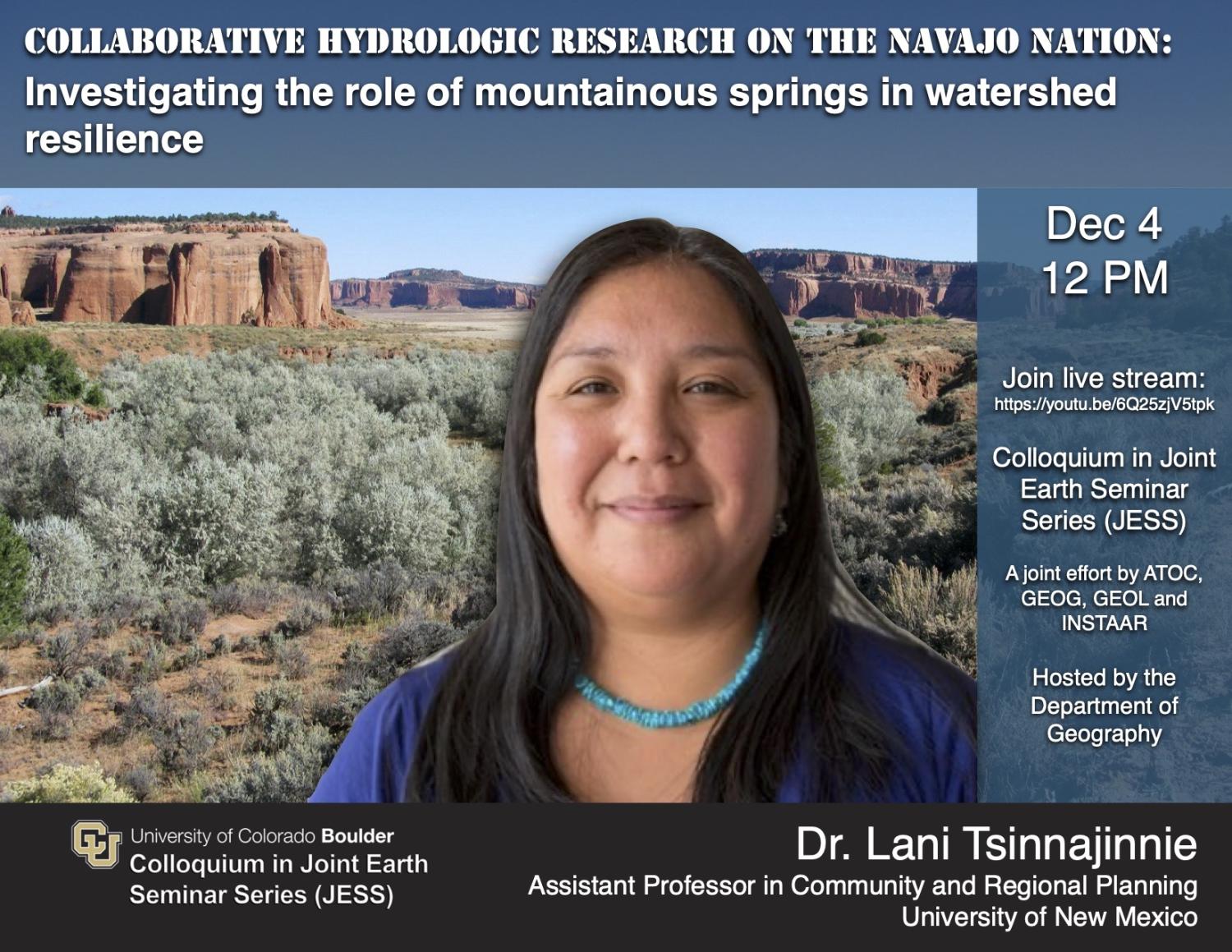Collaborative hydrologic research on the Navajo Nation: Investigating the role of mountainous springs in watershed resilience
Colloquium in Joint Earth Seminar Series (JESS)
A joint effort by ATOC, GEOG, GEOL and INSTAAR
Hosted by the Department of Geography
Dr. Lani Tsinnajinnie
Assistant Professor in Community and Regional Planning
University of New Mexico
Friday, December, 4th at 12:00PM MDT (2:00PM EDT, 11:00AM PDT)
Add the livestream link to your Calendar: Outlook, Google, iCal
Join the livestream: https://youtu.be/6Q25zjV5tpk
Abstract
In this seminar, Dr. Tsinnajinnie will discuss her experience working collaboratively with the Navajo Nation and some of the hydrologic research she has done in the Chuska Mountains. The Navajo Nation, located in the Four Corners region, has the largest reservation in the United States. Since 2008, Dr. Tsinnajinnie has worked collaboratively with the Navajo Nation to understand snowpack variability, groundwater-surface water interactions, streamflow generation, and impacts of climate change to water resources in the Chuska Mountains. The Chuska Mountains, which lie at the center of the reservation along the Arizona/New Mexico border, are the only source of perennial streamflow generated within the Navajo Nation. Springs in the mountains are important water resources as they provide drinking water to nearby communities and are primary contributors to streamflow. Vegetation recovery around springs in the Asaayi Creek watershed after the 2014 Asaayi Lake wildfire exemplified the ecological importance of springs and their potential to act as both fire and climate refugia. Dr. Tsinnajinnie’s research demonstrates how collaborative hydrologic research can be used to inform water management and watershed planning for tribes and local communities.
Bio
Dr. Lani Tsinnajinnie is an Assistant Professor in Community and Regional Planning. Lani is Diné and Filipino and was born and raised in New Mexico. Her home community of Na’Neelzhiin lies in the eastern-most area of the Navajo Nation.
Lani received a B.S. in Environmental Science, a B.A. in Native American Studies, and a Master of Water Resources degree from the University of New Mexico. Following her studies at UNM, she went south to Socorro to receive a PhD in Earth and Environmental Science with a dissertation in Hydrology from New Mexico Tech.
Lani’s expertise is on mountain and watershed hydrology. Her research focuses on groundwater and surface water interactions in semiarid mountainous watersheds and impacts of climate change on mountainous watersheds. She collaborated with the Navajo Nation Water Management Branch for her Master’s and doctoral research. Her doctoral research was primarily funded through a U.S. EPA STAR Fellowship. She also published an article based on her Master’s research on snowpack variability on the Navajo Nation in the Journal of Contemporary Water Research and Education. She’s had previous experience collaborating with other tribes and communities in New Mexico in the various environmental work she has done and was recently appointed to the Navajo Nation Water Rights Commission.


